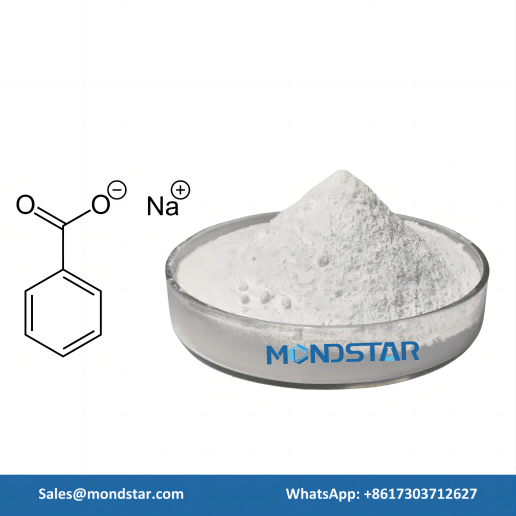Sodium Benzoate Buying Guide—FAQs about buying Sodium Benzoate
If you are struggling to keep your food fresh and safe, then sodium benzoate is ‘the’ choice for you. But how would you know where to buy good quality sodium benzoate. And if it is for you?
In this blog post, we are gonna learn what sodium benzoate is? What are the common misconceptions about it? And if it is safe for you or not.
What is sodium benzoate?
What exactly is sodium benzoate E211? It’s an odorless, granular food preservative that stops microbes from growing. This lets food stay fresh longer. Its chemical formula is C7H5NaO2. It’s made of a sodium molecule bound to the benzoate anion(C7H5O2-).
As an additive, sodium benzoate has antibacterial and antifungal properties. The benzoate part enters cells of yeast, molds, and bacteria. Then it chemically splits apart into benzoic acid, lowering the cell’s internal pH. This acid bath stresses out the cells, preventing AP production and ability to grow and spread.
The preservative works best in acidic environments below pH 4.5. There, undissociated sodium benzoate prevails. That’s why it’s commonly used in fruit juices, sodas, jams, sauces, and pickles – foods too acidic for germs to survive alone. Typical level of sodium benzoate in food is 0.05-0.1%.
The FDA, WHO, and other agencies say sodium benzoate is safe if used properly. But some people may get allergic reactions. There’s also debate about it reacting with vitamin C to form benzene, a carcinogen. Proper purity and dosage are very important.

Is sodium benzoate safe?
Major health groups like the FDA say E211 sodium benzoate is fine for use in small doses as a preservative. Current toxicity data and risk tests approve it. As long as Good Manufacturing Practices are followed, it poses very low risks for most people. Extensive trials find no clear evidence that it causes genetic, developmental, or cancer risks. Acute toxicity is also low, with an LD50 of over 2g/kg body weight. While a small number may get allergic, most people seem fine at approved low levels.
However, there is some worry about sodium benzoate interacting with vitamin C to form benzene – a known carcinogen. The WHO set an upper limit of 5mg/kg body weight per day for total benzoic acid intake from all sources to prevent this. Critics also want more research on potential issues from lifelong low-level exposure.
But major reviews keep confirming its safety at the max 0.1% in food and 0.5% in medicine. The FDA and EFSA both reevaluated it extensively over the years, upholding its GRAS (Generally Recognized as Safe) status. Critics have suspected additives like sodium benzoate could increase hyperactivity in kids, but evidence has been too weak to override approvals. Assuming appropriate purity and doses within established limits, global health authorities still consider it an acceptable preservative.
The function of benzoic acid sodium
The main job of sodium benzoate is to act as a preservative. It helps acidic foods and drinks stay fresh longer by stopping microbes from spoiling them. As an antimicrobial, sodium benzoate works best below pH 4.5. There, its benzoic acid form can permeate germ cell membranes. Once inside, it lowers their internal acidity. This disrupts the cell’s ability to function and reproduce.

Some common uses as a preservative are fruit juices, sodas, jams, sauces, condiments, pickles – stuff too acidic for germs to easily grow. It wards off bacteria, yeasts, and molds. Levels added are typically 0.05-0.1%. Medicines can have up to 0.5%.
Sodium benzoate additive also works as a preservative in cosmetics like moisturizers, shampoos, and mouthwash. Here, levels can reach 1% in leave-on products and 2% in rinse-offs.
Beyond preservation, sodium benzoate can also prevent metal corrosion. It bonds with metal ions. This allows use in engine coolants, heating loops, and other industrial applications.
Additionally, it can slow oxygen degradation of easily oxidized products like vitamins, pharmaceuticals, and foods. So while not a main effect, it brings mild antioxidant powers too.
Does sodium benzoate cause cancer?
Even with some worrying misconceptions out there, there’s no solid human evidence showing that proper use of sodium benzoate as a preservative directly causes cancer. Extensive testing by big agencies like the FDA, WHO, and EFSA has not shown sodium benzoate to cause cancer in animals or permit its use if they had safety concerns. While a couple of lab studies raised questions about possible cell damage, further testing – even at higher doses than people get exposed to – did not show any issues like increased tumors, mutations, or cancer in animals.
The way the body processes sodium benzoate also eases worries. When eaten, benzoate quickly changes into hippuric acid that gets removed safely in urine within 24 hours. This metabolic detoxification prevents buildup. But there are concerns that cancer-causing benzene could form when sodium benzoate interacts with vitamin C under certain situations. While theoretically possible, experts believe the very low levels formed are unlikely to be a real cancer risk given how fast the body eliminates benzoate.
Critics argue that more rigorous long-term research is still needed, especially on the synergy of multiple additives together that might potentially impact cancer risk in the long run. While sodium benzoate alone doesn’t seem tied to cancer, some believe that over decades small amounts interacting with other chemicals might affect cells in ways we don’t yet fully understand. However, given appropriate purity and dosage, both animal and human research currently supports the approved safe use of sodium benzoate in food, cosmetics, and medicine without indicating heightened cancer risk. Still, more definitive research to conclusively confirm it doesn’t cause cancer in humans would be prudent.
Is sodium benzoate gluten-free?
Sodium benzoate is considered gluten-free. As a manufactured salt compound, sodium benzoate contains no gluten sources or protein components from wheat, barley, rye, or related grains that those with celiac disease or gluten sensitivity need to avoid. During the industrial production of sodium benzoate, it comes into no contact with prohibited grains containing gluten proteins. The raw materials used are benzoic acid and sodium hydroxide, neither of which contain gluten. There is no scientifically valid mechanism by which sodium benzoate could become cross-contaminated by gluten either. Since sodium benzoate is highly water soluble, it cannot absorb and carry gluten particles from shared production equipment. Extensive gluten testing also confirms that finished sodium benzoate products contain non-detectable traces. Therefore, sodium benzoate can be conclusively classified as a gluten-free additive. Individuals adhering to a gluten-free diet due to medical necessity or personal preference can safely consume foods containing sodium benzoate. It poses no risk of exposure to prohibited gluten sources.
Is sodium benzoate vegan?
Sodium benzoate can be called vegan. As an artificially made food additive, sodium benzoate contains no animal-derived ingredients. No animal products or byproducts are used in manufacturing it either. Traditionally, one method of producing benzoic acid to make sodium benzoate involved breaking down animal fats. However, nowadays industrial production instead relies on chemically synthesizing it from non-animal sources like petroleum-derived toluene or benzene. The benzoic acid then reacts with synthetic sodium hydroxide to form sodium benzoate. Food additive regulations also require listing the synthetic origin. So modern production methods avoid any conflicts with vegan values. While chemically the same as natural benzoates from plants, commercial sodium benzoate is artificially synthesized. Since no animal materials are used to make or process it, sodium benzoate avoids animal contents entirely. That makes it compatible with vegan diets and suitable to be listed as a vegan product.
Is sodium benzoate safe during pregnancy?
Based on available evidence, sodium benzoate appears safe when used in allowed amounts as a food preservative during pregnancy. Extensive studies, including testing across generations of animals, have found no clear signs that permitted dietary levels of sodium benzoate cause birth defects, mutations, or pose developmental risks to the fetus. No negative effects on fetal health or pregnancy outcomes were seen either. Although the body absorbs more during pregnancy, regular intake as an additive stays under safe limits. Worries that sodium benzoate could bind vitamin C and produce tiny amounts of benzene, a developmental toxicant, still seem theoretical. Experts agree any such interactions would be too low to be unsafe. As with anything, appropriate safety margins based on toxicity data should be followed. While no substance is risk-free, there’s no evidence that sodium benzoate can be a substantial risk to healthy fetal development. Still, talk to your doctor about preservatives based on your specific medical situation during pregnancy.
Is sodium benzoate natural?
No, the sodium benzoate used as an additive isn’t natural – it’s made artificially. While benzoic acid does occur naturally in some fruits and plants, commercial sodium benzoate is manufactured synthetically in industrial processes. Today’s production relies on chemically synthesizing it from petrochemical ingredients like benzene or toluene. The resulting benzoic acid then reacts with synthetic sodium hydroxide to produce sodium benzoate. There’s no natural biological source of sodium benzoate. Food additive laws also require labeling man-made ingredients as such if they weren’t directly derived from real foods. So although chemically identical to plant-based varieties, the sodium benzoate used commercially is made through artificial organic chemical manufacturing.
In summary, sodium benzoate is a widely used preservative that can effectively extend shelf life of many products when used properly. While generally recognized as safe, it’s good to be aware of potential health issues, especially for those with sensitivities. When buying sodium benzoate, consider reputable suppliers like Mondstar, a China-based company with over 10 years of experience providing top-quality food additives and chemicals. Understanding the properties, uses and safety of sodium benzoate allows you to make informed choices when purchasing and using this preservative. Contact us at [email protected].
